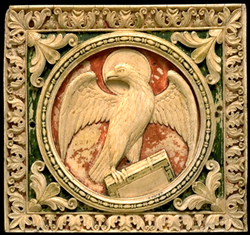In today’s First Reading St. John describes his mission as the communication of an experience. As apostle and evangelist St. John, through his Gospel, his letters, and the Book of Revelation, has tried to communicate an experience difficult to put into words. Alongside the more narrative accounts, not only in his Gospel, but in the Gospels of the other evangelists, John, through images and symbols, always strove to communicate the depth and richness of an experience of God, through his Son, that led to faith and communion. In the Acts of the Apostles St. Peter described an apostle’s qualifications: someone “who accompanied us the whole time the Lord Jesus came and went among us, beginning from the baptism of John until the day on which he was taken up from us, become with us a witness to his resurrection” (Acts 1:21-22). Through their testimony and ministry the Twelve communicated an experience of Christ that drew us into “fellowship” with them and with God.
In today’s Gospel we recall, along with John, one of his most sublime experiences, and experience that changed all our lives forever. Entering the empty tomb on the day of the Resurrection, John simply says that he “saw and believed.” He saw no vision of angels, like Mary Magdalene. He didn’t witness Our Lord directly being risen from the dead. He saw an empty tomb and some linens and in faith he knew his Lord had risen. The empty tomb didn’t mean Our Lord had staged his death: John saw him die on the cross. It didn’t mean Our Lord’s body had been stolen, Mary Magdalene’s “theory.” John knew, in faith, that the empty tomb meant Our Lord had Risen. Death no longer had the last word.
We remember John at Christmastime because his love and faith in Our Lord were always young and pure, just like Our infant Lord at this birth and beyond. Let John and the other evangelists this upcoming year draw you into their experience of faith so that you to can experience afresh Our Lord’s love.
Readings: 1 John 1:1–4; Psalm 97:1–2, 5–6, 11–12; John 20:1a, 2–8. See also Easter Sunday, Mass During the Day.


